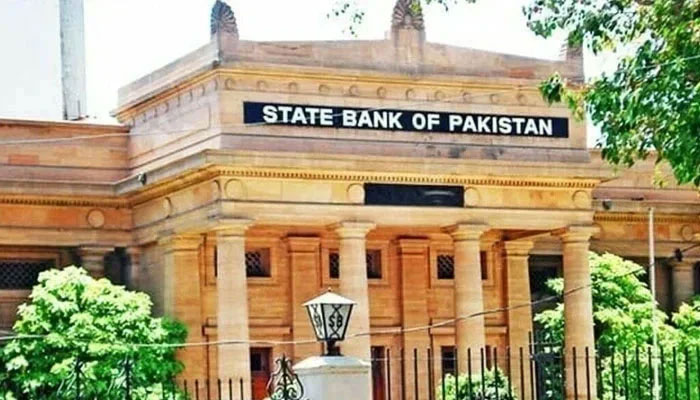Inflation risks in focus: SBP keeps interest rate unchanged at 12% after six consecutive cuts
MPC assesses current real interest rate to be positive on forward-looking basis to sustain ongoing macroeconomic stability
KARACHI: The State Bank of Pakistan unexpectedly paused its easing cycle on Monday, leaving its benchmark policy rate at 12 percent, as risks to inflation from volatile food prices and rising global tariffs keep it cautious.
After a surge in inflation pushed borrowing costs to a record high of 22 percent, the central bank began cutting interest rates in June 2024. By January 2025, it had reduced the main rate by 1,000 basis points. This decision aimed to respond to easing price pressures and stimulate economic growth while managing reforms under a $7 billion bailout from the International Monetary Fund (IMF), which was approved in September 2024.
In a statement, the SBP said the Monetary Policy Committee (MPC) had assessed the risks associated with the inherent volatility of energy and food prices, which could impact the current downward trend in inflation. Additionally, core inflation has proven to be more persistent at elevated levels, suggesting that any increase in food and energy prices may lead to a rise in overall inflation.
“The MPC viewed that some pressures on the external account have emerged due to rising imports amidst weak financial inflows. On balance, the MPC assessed the current real interest rate to be adequately positive on a forward-looking basis to sustain the ongoing macroeconomic stability,” the SBP said.
“On the global front, uncertainty has increased significantly amidst the ongoing tariff escalations, which may have implications for global economic growth, trade, and commodity prices,” it added.
The country’s consumer price index inflation rate slowed to 1.5 percent in February, the lowest level in nearly a decade, from 2.4 percent in the previous month. “The Committee noted that the impact of a sizable earlier reduction in policy rate is now materializing, the central bank said.
“The MPC reiterated the importance of maintaining a cautious monetary policy stance to stabilize inflation within the target range of 5 – 7 percent. This, along with structural reforms, is essential to achieve sustainable economic growth.”
The SBP’s decision surprised markets, as most analysts and financial market players had anticipated a rate cut of only 50 to 100 basis points, with a cautious approach afterward due to the potential for inflation to resurface after May, when the base effect declines. However, the forecast for full-year FY25 inflation is estimated to remain in the single digits, despite some monthly shocks caused by lower base effects.
The SBP met IMF’s NIR target amid ongoing $7 billion bailout review, SBP’s chief told analysts. Pakistan’s central bank said it has successfully met the International Monetary Fund’s (IMF) Net International Reserves (NIR) target for December 2024.
Governor State Bank of Pakistan Jameel Ahmad told analysts in a briefing following the rate cut decision on Monday that the central bank had met the NIR target of December 2024 by a significant margin and anticipates achieving the June 2025 target as well.
The governor’s comments come as the IMF team is in discussions with Pakistani authorities for the first review of the $7 billion Extended Fund Facility (EFF) secured last year. If approved by the IMF’s board, this review could release a $1 billion tranche of funding for the cash-strapped country.
The SBP noted that during the remaining period of FY25, repayments will total around $3 billion, net of rolled over and refinanced amounts. Inflows that were previously planned are expected to materialize in the fourth quarter of FY25, with some of these inflows contingent on a successful IMF review. According to the governor, the government is avoiding external borrowing to secure better terms. He anticipates further developments in this regard in the coming months.
-
 Seedance 2.0: How It Redefines The Future Of AI Sector
Seedance 2.0: How It Redefines The Future Of AI Sector -
 Andrew Mountbatten-Windsor Still Has A Loan To Pay Back: Heres Everything To Know
Andrew Mountbatten-Windsor Still Has A Loan To Pay Back: Heres Everything To Know -
 US House Passes ‘SAVE America Act’: Key Benefits, Risks & Voter Impact Explained
US House Passes ‘SAVE America Act’: Key Benefits, Risks & Voter Impact Explained -
 'Heartbroken' Busy Philipps Mourns Death Of Her Friend James Van Der Beek
'Heartbroken' Busy Philipps Mourns Death Of Her Friend James Van Der Beek -
 Gwyneth Paltrow Discusses ‘bizarre’ Ways Of Dealing With Chronic Illness
Gwyneth Paltrow Discusses ‘bizarre’ Ways Of Dealing With Chronic Illness -
 US House Passes Resolution To Rescind Trump’s Tariffs On Canada
US House Passes Resolution To Rescind Trump’s Tariffs On Canada -
 Reese Witherspoon Pays Tribute To James Van Der Beek After His Death
Reese Witherspoon Pays Tribute To James Van Der Beek After His Death -
 Halsey Explains ‘bittersweet’ Endometriosis Diagnosis
Halsey Explains ‘bittersweet’ Endometriosis Diagnosis -
 'Single' Zayn Malik Shares Whether He Wants More Kids
'Single' Zayn Malik Shares Whether He Wants More Kids -
 James Van Der Beek’s Family Faces Crisis After His Death
James Van Der Beek’s Family Faces Crisis After His Death -
 Courteney Cox Celebrates Jennifer Aniston’s 57th Birthday With ‘Friends’ Throwback
Courteney Cox Celebrates Jennifer Aniston’s 57th Birthday With ‘Friends’ Throwback -
 Camila Cabello Shares Update On Her Hair Two Years After Going Platinum
Camila Cabello Shares Update On Her Hair Two Years After Going Platinum -
 Prince William Steps In To Help Farmer's Awareness Mission
Prince William Steps In To Help Farmer's Awareness Mission -
 Queen Elizabeth Tied To Andrew's Sexual Abuse Case Settlement: Report
Queen Elizabeth Tied To Andrew's Sexual Abuse Case Settlement: Report -
 Mark Ruffalo Urges Fans To Boycott Top AI Company Boycott
Mark Ruffalo Urges Fans To Boycott Top AI Company Boycott -
 Prince William Joins Esports Battle In Saudi Arabia
Prince William Joins Esports Battle In Saudi Arabia




